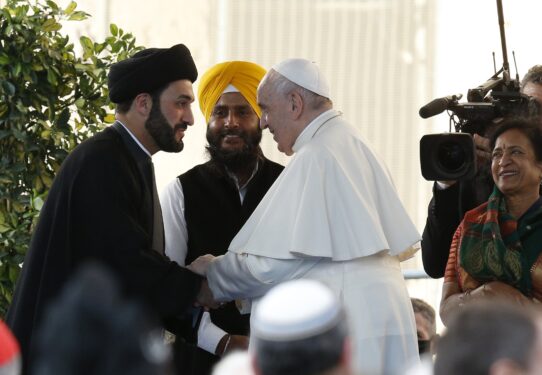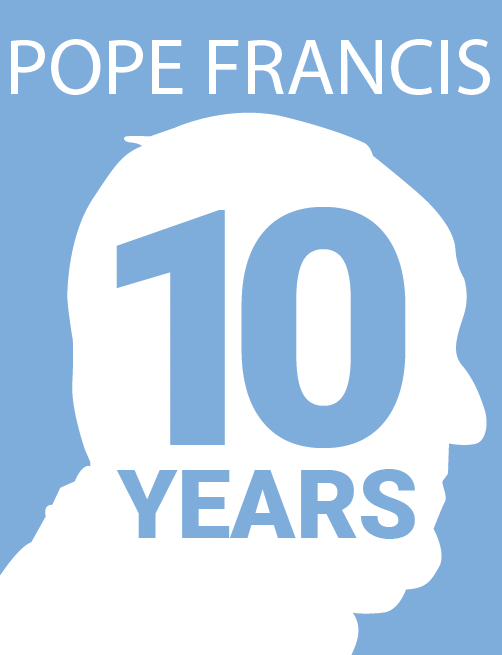
By Gina Christian

“I think in many ways he has brought new life and a breath of fresh air to Muslim-Catholic dialogue,” said Imam Saffet A. Catovic, programs manager and head of the Islamic Society of North America’s Office for Interfaith, Community Alliances and Government Relations. He told OSV News, “We’ve been engaged with the U.S. Conference of Catholic Bishops since 1996 in a formal way, and the pope has given a new impetus to the conversations that have been taking place.”
“I have a very positive perception of the pope,” said Mehnaz M. Afridi, professor of religious studies and director of the Holocaust, Genocide and Interfaith Center at Manhattan College in New York. “He is using Christian teaching to open up Christian minds all over the world to look at recent immigrants from Syria, Iraq and Afghanistan as part of reaching out to the other. … That has been a major push.”
From the start of his papacy, Pope Francis has made it a priority to reach out to Muslims: in March 2013, he washed the feet of two Muslim teens as part of a Holy Thursday Mass he celebrated at a detention center for youth in Italy. He repeated the gesture in 2016, washing the feet of several Muslim immigrants at a center for asylum seekers near Rome.
“That showed a certain humility, grace and acceptance,” Afridi told OSV News.
Upon his election, Pope Francis also brought with him long-established interfaith friendships from his native Argentina: in 2014, he traveled to Israel, Jordan and Palestine with both Rabbi Abraham Skorka and Sheikh Omar Abboud, co-president of the Institute for Interreligious Dialogue in Buenos Aires, and former secretary-general of the Islamic Center of Argentina.
In 2019, Pope Francis visited Abu Dhabi, where he and Egypt’s Grand Imam of Al-Azhar, Sheikh Ahmad el-Tayeb, signed the “Document on Human Fraternity for World Peace and Living Together.” The text invited “all persons who have faith in God and faith in human fraternity to unite and work together,” while affirming universal human rights and calling for “reconciliation and fraternity among all believers, indeed among believers and non-believers, and among all people of good will.”
The pope’s five visits to Africa, including his January 2023 trip to Congo and South Sudan, have also been a powerful endorsement of Muslim-Catholic dialogue, both Catovic and Afridi said.
Part of Pope Francis’ legacy is “the recognition that in many locations around the world, with Africa as a prime example, you have side-by-side encounters between Catholic churches, newer Christian churches and mosques,” Catovic said.
“Where there is strife, he has asked for calm and acceptance of each other,” said Afridi.
In 2021, Pope Francis became the first pontiff to visit Iraq (a goal Pope St. John Paul II was unable to attain due to tensions at the time), describing the site of ancient Ur as a “blessed place (that) brings us back to our origins” and meeting privately with Grand Ayatollah Ali al-Sistani, the spiritual leader of Iraq’s Shiite Muslims.
The warm tenor of Pope Francis’ engagement with Muslims contrasts with “a sort of cooling” that took place under his late predecessor, Pope Benedict XVI, said Catovic.
In September 2006, Pope Benedict XVI sparked controversy following an address at the University of Regensburg, in which he cited a Byzantine emperor who described the Prophet Muhammad’s views on religion and violence as “evil and inhuman.”
Although the pope was quick to apologize, stressing the quote did not represent his personal view of the Quran, Muslims worldwide took offense at “a reviving of old tropes and stereotypes … (and) medieval mischaracterizations of Islam,” said Catovic. “It was very hurtful to Muslims.”
The incident ultimately led to the “A Common Word Between Us and You” document, issued in 2007 by 138 Muslim scholars, clerics and intellectuals representing the spectrum Islamic thought. The text declared that “the future of the world depends on peace between Muslims and Christians,” and pointed to the necessity of love for God and neighbor as “the common ground between Islam and Christianity.”
“Pope Francis has revived this in a big way,” said Catovic, noting that the pope’s 2020 encyclical “Fratelli Tutti” built in part on the 2019 document signed with the Grand Imam of Al-Azhar — as Pope Francis himself stated in the text’s opening paragraphs.
Afridi agreed, saying the encyclical “has made a huge difference in how Muslims perceive Pope Francis.”
She and Catovic said the pope’s focus on shared concerns such as immigration, economic justice and care for the environment, rather than theological differences, has helped advance Muslim-Catholic relations considerably.
“If earth is our common home, we’re neighbors,” said Catovic. “That resonates well with members of the Muslim community.”
“Pope Francis has been very inclusive (regarding) Muslim dialogue,” said Afridi. “That’s huge for us.”
